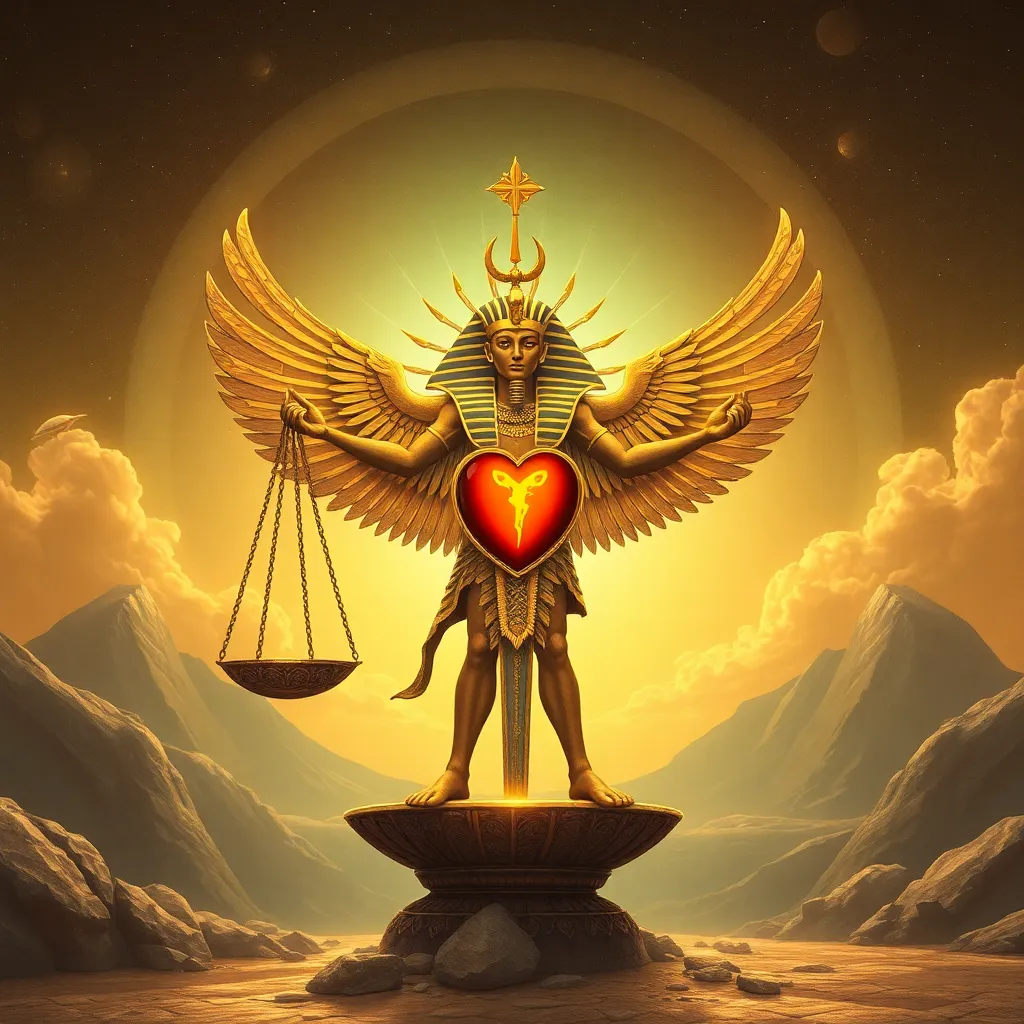The Myth of the Divine Balance: The Weighing of the Heart
I. Introduction
The concept of divine balance is a prevalent theme across various cultures, often symbolizing the equilibrium between good and evil, chaos and order. In ancient Egyptian mythology, this concept is vividly illustrated through the weighing of the heart, a pivotal ritual that determined one’s fate in the afterlife.
This article aims to explore the myth of the weighing of the heart, its origins, and its implications for ancient Egyptians and its enduring significance in contemporary discussions about morality, ethics, and balance in the human experience.
II. Historical Context of the Weighing of the Heart
The myth of the weighing of the heart originates from ancient Egyptian beliefs surrounding the afterlife. Central to this belief was the goddess Ma’at, who represented truth, justice, and cosmic order. Ma’at’s principles were foundational to Egyptian society, influencing laws and moral conduct.
Upon death, an individual’s soul embarked on a journey to the afterlife, where they would face the weighing ceremony. This ritual involved the heart of the deceased being placed on one side of a scale, while Ma’at’s feather, symbolizing truth and justice, was placed on the other side. The outcome of this weighing would determine whether the soul would enter paradise or face annihilation.
III. The Symbolism Behind the Heart and Feather
In Egyptian thought, the heart was viewed as the seat of the soul and the center of emotions, intellect, and morality. It was believed that the heart contained the essence of a person’s life and actions.
The feather of Ma’at, on the other hand, symbolized truth, justice, and the moral integrity required for a positive judgment. The balance between the heart and the feather represented a moral and ethical measure of one’s life, showcasing the importance of living in accordance with Ma’at’s principles.
IV. The Weighing Ceremony: Rituals and Beliefs
The weighing ceremony was a profound and intricate process. Here’s a detailed description of how it unfolded:
- The deceased was brought before a divine tribunal, presided over by Osiris, the god of the afterlife.
- Anubis, the god of mummification and the protector of graves, weighed the heart against Ma’at’s feather.
- If the heart was lighter than or equal to the feather, the soul was deemed worthy and allowed to enter the Field of Reeds, a paradise where they would enjoy eternal life.
- If the heart was heavier, burdened by sins and wrongdoings, it was devoured by Ammit, the soul-eating demon, leading to complete annihilation.
This ceremony encapsulated the ancient Egyptians’ beliefs about morality, justice, and the consequences of one’s actions in life.
V. The Myth’s Influence on Modern Spirituality
Today, the concept of divine balance continues to resonate in various spiritual and philosophical traditions. Many contemporary beliefs emphasize the importance of living a balanced life, where actions are weighed against ethical considerations. Some parallels can be drawn with:
- Buddhism’s concept of karma, where actions have consequences that affect one’s future.
- Christianity’s teachings on judgment and the afterlife, focusing on moral conduct.
- Eastern philosophies that advocate for harmony and balance in life.
The myth of the weighing of the heart serves as a potent reminder of the moral fabric that influences human behavior and the continuous pursuit of justice and balance.
VI. Criticism and Alternative Interpretations
While the weighing of the heart myth is widely accepted, some scholars criticize the literal interpretation of the myth, suggesting it may represent metaphorical concepts rather than an actual judgment process. Alternative views propose that:
- The myth reflects psychological themes of self-reflection and personal accountability.
- Judgment may not be an external process, but rather an internal one where individuals confront their own actions.
These interpretations invite a deeper discussion on the nature of judgment and balance, transcending the literal narrative to explore its psychological implications on the human psyche.
VII. The Legacy of the Weighing of the Heart in Popular Culture
The myth of the weighing of the heart has left an indelible mark on popular culture, inspiring countless representations in literature, art, and media. Some notable influences include:
- Literary works that explore themes of morality and justice, often drawing parallels to the weighing of the heart.
- Artistic depictions of the ceremony, showcasing the dramatic contrast between light and heavy hearts.
- Modern adaptations in films and video games that incorporate the theme of judgment and balance.
This myth continues to inspire storytelling and character development, serving as a touchstone for narratives that grapple with moral dilemmas and the consequences of one’s actions.
VIII. Conclusion
In summary, the myth of the weighing of the heart encapsulates profound themes of morality, justice, and the quest for balance that resonate through time. From its historical roots in ancient Egyptian culture to its influence on modern spirituality and popular culture, this myth remains relevant in discussions about the ethical dimensions of human experience.
As we navigate the complexities of life, the pursuit of balance and justice remains a fundamental aspect of our existence, reminding us of the weight our actions carry and the truths we must uphold.




